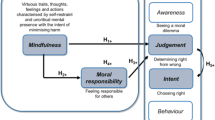Abstract
This paper considers the converse of the principle that ‘ought’ implies ‘can’, namely, the principle that ‘must’ implies ‘ought’. It argues that this principle is the central premiss for Mill's argument that happiness is desirable (worthy of desire), and it examines the sense of ‘must’ that is relevant and the implications it has for Mill's moral philosophy.
Similar content being viewed by others
Author information
Authors and Affiliations
Rights and permissions
About this article
Cite this article
Wilson, F. Mill's proof that happiness is the criterion of morality. J Bus Ethics 1, 59–72 (1982). https://doi.org/10.1007/BF00382808
Received:
Issue Date:
DOI: https://doi.org/10.1007/BF00382808




